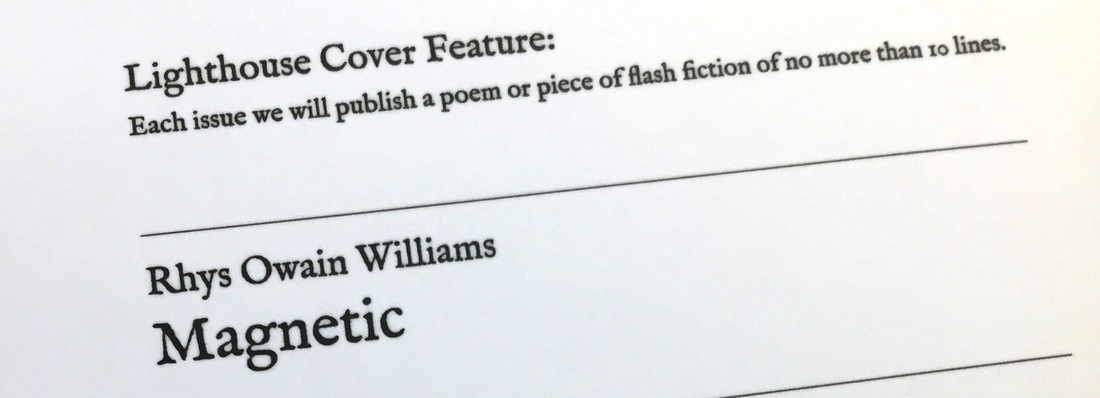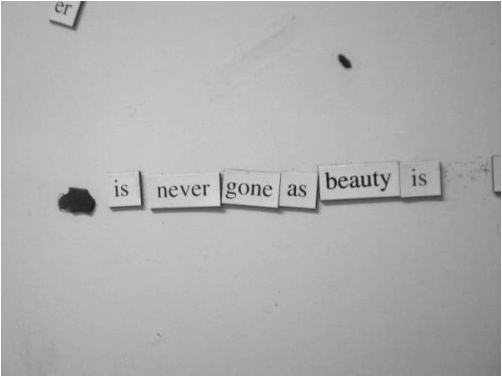Lighthouse #9
8/9/2015
Usually, if I'm writing a blog post about having something published in a magazine, I would open with a sentence along the lines of "a poem of mine was recently featured in...". But, even though my name appears above it on the back cover of the latest issue of Lighthouse, 'Magnetic' isn't my poem – at least not in the traditional sense. Found poetry is a form where poets take existing text and repurpose or reframe it as a new piece of writing. The existing text might come from a newspaper article, a political speech, a piece of graffiti or even another poem, with the resulting found poem being defined as either 'treated' or 'untreated'. As an art form, there are obvious comparisons with the controversial objets trouvés of the visual arts – and, as you might expect, found poets are sometimes also accused of hiding behind the ready-made. Though I disagree that found poetry is intellectual theft on the same level as the recent Laventille fiasco, it is hard to argue against the fact that it occasionally enters the grey area that exists between appropriation and plagiarism. When I first submitted this poem to Lighthouse for their 'writing with constraints' issue, it came with a disclaimer: Five poems found on my fridge, created by friends and friends of friends using magnetic words. Written in size 10 font just below the title, this was my attempt to give a source (and, I suppose, to distance myself from accusations of stealing), but it was sliced away – along with a small number of other flabby words and phrases – following some welcome suggestions from Lighthouse editors Julia Webb and Anna de Vaul. For me, the joy of this particular form is finding poetry in unlikely places. Elsewhere in this issue of Lighthouse, for example, is a found poem formed from a medieval act of parliament. Like 'Magnetic', this poem – 'An Acte for the Preservation of Grayne, 1566' by Matt Howard – is untreated (as far as I can tell), but it’s also taken from an existing text that was never intended to be a poem. This is where the two poems differ, and where mine enters that aforementioned grey area. After fountain pens and moleskine notebooks, Magnetic Poetry is undoubtedly the go-to stocking filler for writers (I have two sets myself – the second being a postcard 'expansion pack' featuring only Scots words). Anyone who has tried to string a series of magnetic words together to form anything other than some half-funny sexual innuendo will be aware of the limited vocabulary on offer. There is no magnetic equivalent of Thesaurus.com – you have to make do with the words you are dealt. Although this liberates you from the search for the perfect synonym, it does also present a constraint. For the original poets (whoever they are), what they wanted to say was limited by the words they could find on my fridge. An extra layer of constraint is added by the fact that I chose to present this series of five 'micro-poems' in exactly the same way that I found them, with my editorial thirst quenched by the cutting of five other magnetic poems that didn't make it.
Whilst writing this blog post, I've flip-flopped between thinking that it's perfectly fine to take five magnetic poems created by other people and submit them under my own name, and thinking that it's one of the worst things that I could do as a writer. My solace is found in the fact that these poems were never intended for print, and so by turning them into a found poem I've allowed them to transcend the medium of magnetic poetry and find a new audience. However, I admit that there’s at least a faint whiff of bullshit in that last sentence. Either way, I still feel more comfortable in saying that the latest issue of Lighthouse includes a poem I found, rather than a poem 'of mine'. At least then I'm acknowledging that I'm a thieving bastard, but not a dishonest one. Lighthouse 9 was launched at The Bicycle Shop, Norwich last month. I would've loved to have made the launch, but unfortunately Norfolk is a good 5 hours away from my house in Swansea (and it was a school night), so I had to make do with receiving a copy in the post. If you missed the launch too, you can pick up a copy from the Gatehouse Press website.
2 Comments
10/9/2015 12:01:51 pm
I came 3rd in a good comp with a poem I found in an online draft of a textbook. It was my first attempt at this form and I had to think hard about permissions and acknowledgements. One question I found useful was, if I didn't want to acknowledge, why didn't I want to acknowledge? In the end, I made sure the author knew what I was doing and that he consented. I also acknowledged him and the co-author in submitting. The author, a US academic, was fine until it became clear the poem was attracting praise. At that point, he informed me he was putting it on his CV too. I think that's fair enough, really. I found it all very interesting, as is your piece.
Reply
Mark Hutchinson
10/9/2015 01:53:52 pm
In reading this, it seemed to me that you took poems written by your friends, albeit on your fridge, and took credit for their creative work. we're the poems exactly the same, or have I misunderstood?
Reply
Leave a Reply. |
Categories
All
Archives
January 2024
|


 RSS Feed
RSS Feed
